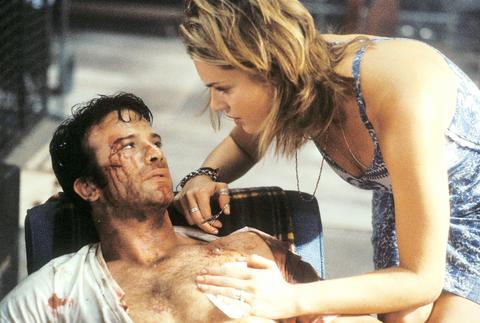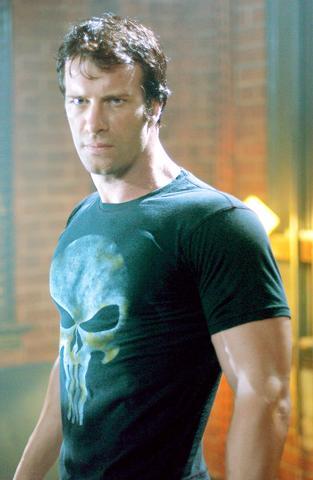The Punisher, a Marvel Comics crime fighter introduced in 1974, is unusual among superheroes (especially Marvel colleagues like Spiderman, the Hulk and the X-Men) for his lack of super powers. His grim, brutal crusade against sundry wrongdoers is enabled not by spider sense or superhuman strength, but by guns, military training and righteous fury.
Jonathan Hensleigh's movie version of the Punisher's origins stays true to its hero by being similarly stripped-down, efficient and mean. At a time when comic-book film adaptations have become showcases for the latest computer-assisted special effects, The Punisher is a straightforward, somewhat old-fashioned action picture, full of gunfire and hand-to-hand combat, leading to a climax in which several dozen cars explode. The only unusual gadget the hero employs is a portable fire hydrant, which may have some potential as a merchandising tie-in.

PHOTO COURTESY OF E MOVIE
In any case, The Punisher, loaded with grim, sadistic violence and more than two hours long, certainly lives up to its name. Played with unsmiling determination by Tom Jane, who exhibits none of the loose charm he showed as Mickey Mantle in 61* on HBO, the Punisher starts out as Frank Castle, a Special Forces veteran just retired from the FBI His last undercover operation resulted in the accidental death of a suspect who happens to have been the beloved son of a ruthless nightclub owner, money launderer and corporate mogul named Howard Saint.

As Saint, John Travolta, a lock of long hair perpetually threatening to fall over his eyes, basically reprises his villainous turn from the toxic Swordfish a few years back, with family feeling replacing greed as the character's primary motive for evil-doing.
Urged on by his wife (Laura Harring), Saint takes revenge on Castle by wiping out his whole extended family during a reunion in Puerto Rico.
Among the dead are Castle's wife (Samantha Mathis), father (Roy Scheider) and young son (Marcus Johns). Mother and son are shown in desperate and prolonged flight from their fates in a scene meant to emphasize the depraved cruelty of the bad guys and to justify the bloody payback that follows.
Throughout the picture, we are repeatedly invited to see just how much pleasure the Punisher's enemies -- in particular, Saint's right-hand baddie, Quentin Glass (Will Patton) -- take in inflicting pain on their victims, so that we can savor the prospect of punishment to follow. But the moral boundary that separates the Punisher -- or, for that matter, the filmmakers -- from his prey is vaporous, since his acts of vengeance match or exceed the original crimes in their grisly ingenuity.
Of course, to make such a point is to entertain nuances and distinctions for which The Punisher has no use. Its lack of subtlety is clearly a point of pride, and Hensleigh's flat-footed, hard-punching style has a blunt ferocity that makes Kill Bill look like In the Bedroom.
A few set pieces were clearly meant to have a grisly, Tarantinoesque wit; it hardly seems coincidental that the movie's coldblooded torture artiste is named Quentin. But lightness is not among Hensleigh's gifts. Making his directorial debut after a successful run as a screenwriter and producer (on projects like Die Hard With a Vengeance, Jumanji and The Rock) he has clearly conceived The Punisher as a throwback to the leathery, angry urban revenge movies of the 1970s.
In the Dirty Harry and Death Wish pictures of that era -- also the time of the Punisher's comic-book birth -- gracelessness functioned as a sign of macho integrity. The movie comes closest to honoring this tradition in its less operatic sequences (and in one that involves a wall-smashing fight scored to La donna mobile), which is also when it approaches the moodiness and eccentricity of the best Marvel comics.
The Punisher, holed up in a warehouse in a gritty part of Tampa, is befriended by his neighbors, three bohemian misfits played by Ben Foster, Jon Pinette and Rebecca Romijn-Stamos. Their quirky harmlessness and easy recognition of Castle as a fellow outsider give a touch of sweetness and humanity to a movie that is otherwise remorselessly ugly and punishingly inhumane.

April 14 to April 20 In March 1947, Sising Katadrepan urged the government to drop the “high mountain people” (高山族) designation for Indigenous Taiwanese and refer to them as “Taiwan people” (台灣族). He considered the term derogatory, arguing that it made them sound like animals. The Taiwan Provincial Government agreed to stop using the term, stating that Indigenous Taiwanese suffered all sorts of discrimination and oppression under the Japanese and were forced to live in the mountains as outsiders to society. Now, under the new regime, they would be seen as equals, thus they should be henceforth

Last week, the the National Immigration Agency (NIA) told the legislature that more than 10,000 naturalized Taiwanese citizens from the People’s Republic of China (PRC) risked having their citizenship revoked if they failed to provide proof that they had renounced their Chinese household registration within the next three months. Renunciation is required under the Act Governing Relations Between the People of the Taiwan Area and the Mainland Area (臺灣地區與大陸地區人民關係條例), as amended in 2004, though it was only a legal requirement after 2000. Prior to that, it had been only an administrative requirement since the Nationality Act (國籍法) was established in

With over 80 works on display, this is Louise Bourgeois’ first solo show in Taiwan. Visitors are invited to traverse her world of love and hate, vengeance and acceptance, trauma and reconciliation. Dominating the entrance, the nine-foot-tall Crouching Spider (2003) greets visitors. The creature looms behind the glass facade, symbolic protector and gatekeeper to the intimate journey ahead. Bourgeois, best known for her giant spider sculptures, is one of the most influential artist of the twentieth century. Blending vulnerability and defiance through themes of sexuality, trauma and identity, her work reshaped the landscape of contemporary art with fearless honesty. “People are influenced by

Three big changes have transformed the landscape of Taiwan’s local patronage factions: Increasing Democratic Progressive Party (DPP) involvement, rising new factions and the Chinese Nationalist Party’s (KMT) significantly weakened control. GREEN FACTIONS It is said that “south of the Zhuoshui River (濁水溪), there is no blue-green divide,” meaning that from Yunlin County south there is no difference between KMT and DPP politicians. This is not always true, but there is more than a grain of truth to it. Traditionally, DPP factions are viewed as national entities, with their primary function to secure plum positions in the party and government. This is not unusual